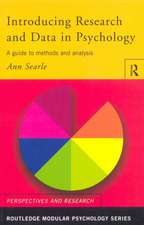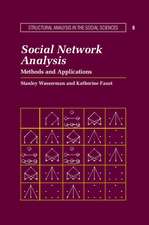Transformative Research and Evaluation
Autor Donna M. Mertensen Limba Engleză Paperback – dec 2008
From distinguished scholar Donna M. Mertens, this book provides a framework for making methodological decisions and conducting research and evaluations that promote social justice. The transformative paradigm has emerged from—and guides—a broad range of social and behavioral science research projects with communities that have been pushed to the margins, such as ethnic, racial, and sexual minority group members and children and adults with disabilities. Mertens shows how to formulate research questions based on community needs, develop researcher–community partnerships grounded in trust and respect, and skillfully apply quantitative, qualitative, and mixed-methods data collection strategies. Practical aspects of analyzing and reporting results are addressed, and numerous sample studies are presented.
Student- and Instructors-Friendly Features Include:
*Commentary on the sample studies that explains what makes them transformative.
*Explanations of key concepts related to oppression, social justice, and the role of research and evaluation.
*Questions for Thought to stimulate critical self-reflection and discussion.
*Advance chapter organizers and chapter summaries.
Student- and Instructors-Friendly Features Include:
*Commentary on the sample studies that explains what makes them transformative.
*Explanations of key concepts related to oppression, social justice, and the role of research and evaluation.
*Questions for Thought to stimulate critical self-reflection and discussion.
*Advance chapter organizers and chapter summaries.
Preț: 395.51 lei
Nou
Puncte Express: 593
Preț estimativ în valută:
75.68€ • 79.22$ • 62.99£
75.68€ • 79.22$ • 62.99£
Carte disponibilă
Livrare economică 10-24 martie
Livrare express 21-27 februarie pentru 37.03 lei
Preluare comenzi: 021 569.72.76
Specificații
ISBN-13: 9781593853020
ISBN-10: 1593853025
Pagini: 402
Dimensiuni: 152 x 229 x 33 mm
Greutate: 0.57 kg
Ediția:1
Editura: Guilford Publications
Colecția Guilford Press
ISBN-10: 1593853025
Pagini: 402
Dimensiuni: 152 x 229 x 33 mm
Greutate: 0.57 kg
Ediția:1
Editura: Guilford Publications
Colecția Guilford Press
Public țintă
Professional Practice & DevelopmentNotă biografică
Donna M. Mertens is Professor in the Department of Educational Foundations and Research at Gallaudet University, where she teaches advanced research methods and program evaluation to deaf and hearing students. She received the Distinguished Faculty Award from Gallaudet in 2007. The primary focus of her work is transformative mixed-methods inquiry in diverse communities that prioritizes ethical implications of research in pursuit of social justice. A past president of the American Evaluation Association (AEA), Dr. Mertens provided leadership in the development of the International Organization for Cooperation in Evaluation and the establishment of the AEA Diversity Internship Program with Duquesne University. She received AEA’s highest honor for service to the organization and the field. She has published numerous books and journal articles; conducts and consults on evaluations; and leads professional development activities on research and evaluation in many national and international settings.
Cuprins
Introduction
The Intersection of Applied Social Research and Program Evaluation
Paradigms
Rationale for the Transformative Paradigm
Breadth of Transformative Paradigm Applicability
1. Resilience, Resistance, and Complexities That Challenge
In This Chapter
Human Rights Agenda
The Transformative Paradigm as a Metaphysical Umbrella
Need for Transformative Research and Evaluation
Examples of Transformative Research and Evaluation
Examples of Shifting Paradigms
Need for the Transformative Paradigm and Scholarly Literature
Need for the Transformative Paradigm and Public Policy
Complexities That Challenge
Ethical Impetus
Striving for Improved Validity
Summary
2. The Transformative Paradigm: Basic Beliefs and Commensurate Theories
In This Chapter
Paradigms and Basic Belief Systems
The Transformative Paradigm and Its Basic Belief Systems
Theories Commensurate with the Transformative Paradigm
Politics and Power
Summary
3. Self, Partnerships, and Relationships
In This Chapter
Human Relations as Factors Contributing to Research Validity and Rigor
Knowing Yourself
Knowing Yourself in Relation to the Community
Cultural Competence
Strategies for Developing Relationships/Partnerships
Types of Partnerships/Relationships
Challenges in Relationships/Partnerships
Recognizing the Complexity of Culturally Competent Work
Purposes of Partnerships
Examples of Points of Interaction in the Research Process
Building Capacity
Summary
4. Developing the Focus of Research/Evaluation Studies
In This Chapter
Purposes for the Gathering of Information at This Stage of the Inquiry
Sources That Support the Need for Research and Evaluation
Theoretical Frameworks
Making Use of Sources
Summary
5. A Transformative Research and Evaluation Model
In This Chapter
Cyclical Models: Indigenous Peoples
Cyclical Model: PAR
Cyclical Models: Immigrant Communities
Short-Term Research and Evaluation
Types of Transformative Research and Evaluation
Transformative Intervention Approaches
Summary
6. Quantitative, Qualitative, and Mixed Methods
In This Chapter
Mixed- and Multiple-Methods Approaches
Case Studies
Ethnography
Phenomenology
Participatory Action Research
Appreciative Inquiry
Experimental and Quasi-Experimental Designs
Survey Design and Correlational and Causal-Comparative Studies
Gender Analysis: A Mixed-Methods Approach with Potential Transfer to Other
Groups That Experience Discrimination
Rigor in the Process of Research and Evaluation
Summary
7. Participants: Identification, Sampling, Consent, and Reciprocity
In This Chapter
Social Justice: Dimensions of Diversity and Cultural Competence
Rationale for Sampling Strategies
Recruitment of Participants
Protection of Human Participants and Ethical Review Boards
Summary
8. Data-Collection Methods, Instruments, and Strategies
In This Chapter
Reliability and Validity/Dependability and Credibility
Language as a Critical Issue
Planning Data-Collection Strategies
Specific Data-Collection Strategies
Summary
9. Data Analysis and Interpretation
In This Chapter
Transformative Theories as Guides to Data Analysis and Interpretation
Involving the Community in Analysis and In
The Intersection of Applied Social Research and Program Evaluation
Paradigms
Rationale for the Transformative Paradigm
Breadth of Transformative Paradigm Applicability
1. Resilience, Resistance, and Complexities That Challenge
In This Chapter
Human Rights Agenda
The Transformative Paradigm as a Metaphysical Umbrella
Need for Transformative Research and Evaluation
Examples of Transformative Research and Evaluation
Examples of Shifting Paradigms
Need for the Transformative Paradigm and Scholarly Literature
Need for the Transformative Paradigm and Public Policy
Complexities That Challenge
Ethical Impetus
Striving for Improved Validity
Summary
2. The Transformative Paradigm: Basic Beliefs and Commensurate Theories
In This Chapter
Paradigms and Basic Belief Systems
The Transformative Paradigm and Its Basic Belief Systems
Theories Commensurate with the Transformative Paradigm
Politics and Power
Summary
3. Self, Partnerships, and Relationships
In This Chapter
Human Relations as Factors Contributing to Research Validity and Rigor
Knowing Yourself
Knowing Yourself in Relation to the Community
Cultural Competence
Strategies for Developing Relationships/Partnerships
Types of Partnerships/Relationships
Challenges in Relationships/Partnerships
Recognizing the Complexity of Culturally Competent Work
Purposes of Partnerships
Examples of Points of Interaction in the Research Process
Building Capacity
Summary
4. Developing the Focus of Research/Evaluation Studies
In This Chapter
Purposes for the Gathering of Information at This Stage of the Inquiry
Sources That Support the Need for Research and Evaluation
Theoretical Frameworks
Making Use of Sources
Summary
5. A Transformative Research and Evaluation Model
In This Chapter
Cyclical Models: Indigenous Peoples
Cyclical Model: PAR
Cyclical Models: Immigrant Communities
Short-Term Research and Evaluation
Types of Transformative Research and Evaluation
Transformative Intervention Approaches
Summary
6. Quantitative, Qualitative, and Mixed Methods
In This Chapter
Mixed- and Multiple-Methods Approaches
Case Studies
Ethnography
Phenomenology
Participatory Action Research
Appreciative Inquiry
Experimental and Quasi-Experimental Designs
Survey Design and Correlational and Causal-Comparative Studies
Gender Analysis: A Mixed-Methods Approach with Potential Transfer to Other
Groups That Experience Discrimination
Rigor in the Process of Research and Evaluation
Summary
7. Participants: Identification, Sampling, Consent, and Reciprocity
In This Chapter
Social Justice: Dimensions of Diversity and Cultural Competence
Rationale for Sampling Strategies
Recruitment of Participants
Protection of Human Participants and Ethical Review Boards
Summary
8. Data-Collection Methods, Instruments, and Strategies
In This Chapter
Reliability and Validity/Dependability and Credibility
Language as a Critical Issue
Planning Data-Collection Strategies
Specific Data-Collection Strategies
Summary
9. Data Analysis and Interpretation
In This Chapter
Transformative Theories as Guides to Data Analysis and Interpretation
Involving the Community in Analysis and In
Recenzii
"I've been searching for the right text for my master's-level course entitled Research in Community Settings. I've just finished reading this book, and I think it is terrific! It is just right for a course in which students will be engaging in community-university partnerships as well as learning to think critically about research."--Robb Travers, PhD, Department of Psychology, Wilfrid Laurier University, Waterloo, Ontario, Canada
"As the world becomes more interconnected and diverse, our research methods need to keep up with changes. Mertens writes beautifully about conducting research in the service of social justice, using a transformative lens and focusing clearly on each step in the process. This book illustrates why Mertens is so highly regarded for her writing that links research methods theory with practice. I highly recommend this book for researchers and graduate students across the social and human sciences."--John W. Creswell, Department of Educational Psychology, University of Nebraska-Lincoln"Mertens gets to the heart of how to ground research and evaluation projects in a social justice framework, in line with multiple disciplinary perspectives that embrace a transformative paradigm. This book will challenge students--including those who have not previously questioned their basic societal beliefs and assumptions--to explore diversity and oppression issues in new ways. I appreciated the inclusion of truly diverse groups, including ethnocultural minority groups and others, in the discussions of the various research and evaluation projects. The international examples and perspectives were very refreshing, too."--Gary W. Harper, Department of Psychology, DePaul University
"With the increase in awareness of diversity, a book like this one is long overdue. This is the first book I have read that comprehensively discusses how to approach evaluation using strategies that are culturally appropriate and inclusive of diverse communities. Mertens provides a holistic and inclusive way of thinking about research methodology. She does a wonderful job of explaining the transformative paradigm in lay language."--Katrina L. Bledsoe, Associate Project Director, Walter R. McDonald & Associates, Washington, DC
"This important book assembles the complex array of procedures, perspectives, and priorities associated with transformative research and evaluation. It blends the many voices and illustrations available in the literature to assist the reader in identifying what is possible in this important new paradigm. Significant cross-cultural and international examples of studies that truly warrant the label of 'transformative' are incorporated."--Melvin E. Hall, Department of Educational Psychology, Northern Arizona University
This is the first book that specifically addresses research methodology for the transformative perspective....Although the book prioritizes an educational focus, it has relevance beyond education and scholars from management disciplines can add a practical and penetrating reading to their research toolbox....The audience encompasses novice researchers and evaluators, advanced undergraduate and beginning graduate students, more experienced teachers and evaluators....This book reminds us all that social research is embedded within a system of values and the myth of objective and value-free research should be discharged. It demonstrates how to blend science and action in an attempt to solve specific problems and promote social change.
--Organizational Research Methods, 11/1/2008Descriere
From distinguished scholar Donna M. Mertens, this book provides a framework for making methodological decisions and conducting research and evaluations that promote social justice. The transformative paradigm has emerged from&











